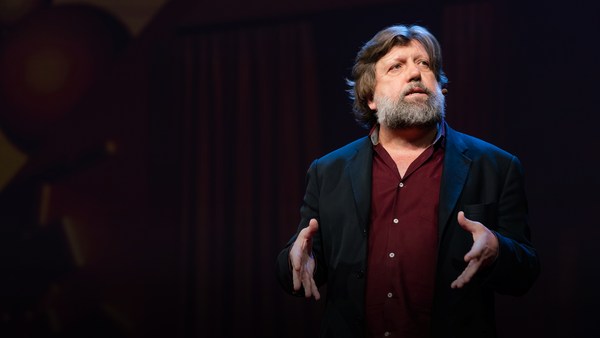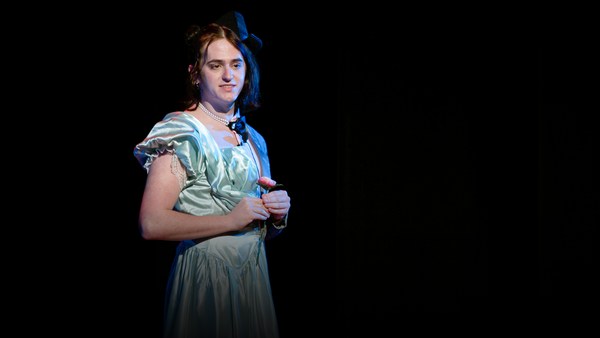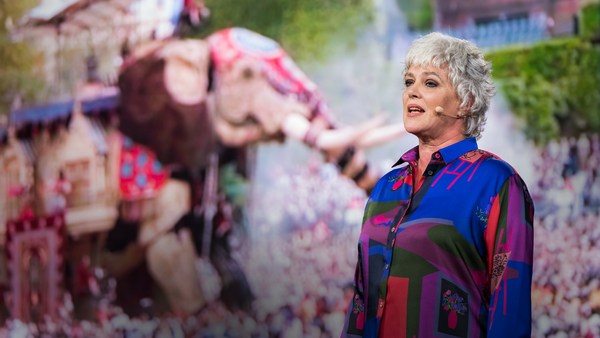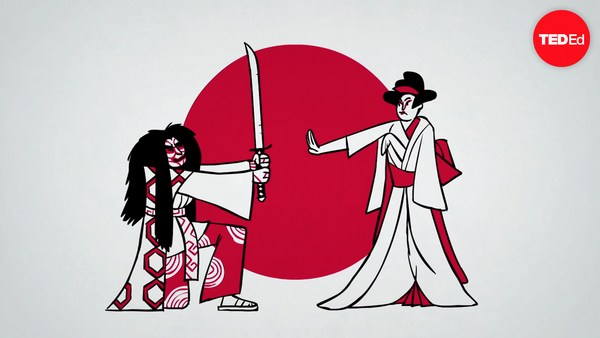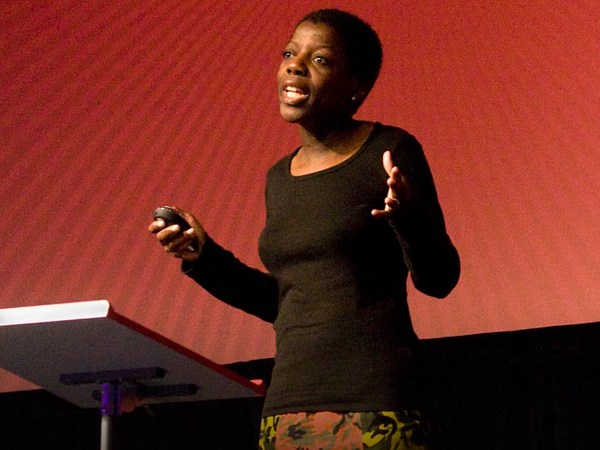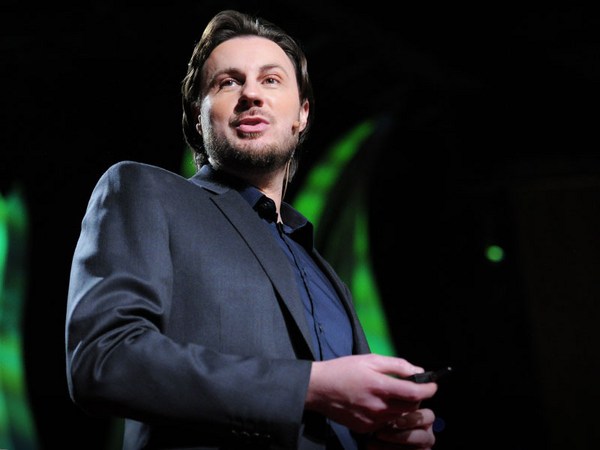"O for a Muse of fire, that would ascend the brightest heaven of invention, a kingdom for a stage, princes to act and monarchs to behold the swelling scene!” Though, to be totally honest, right now, I'd settle for a real school day, a night out and a hug from a friend. I do have to admit that Wrigley Field does make a pretty awesome stage, though.
The words that I spoke at the beginning, "O for a Muse of fire," et cetera, are Shakespeare's. He wrote them as the opening to his play "Henry V," and they're are also quite likely the first words ever spoken on the stage of the Globe Theater in London, when it opened in 1599. The Globe would go on to become the home for most of Shakespeare's work, and from what I hear, that Shakespeare guy was pretty popular. But despite his popularity, just four years later, in 1603, The Globe would close for an extended period of time in order to prevent the spreading and resurgence of the bubonic plague. In fact, from 1603 to 1613, all of the theaters in London were closed on and off again for an astonishing 78 months.
Here in Chicago, in 2016, new theaters were opening as well. The Steppenwolf had just opened its 1,700 theater space. The Goodman, down in the Loop, had just opened its new Center for Education and Engagement. And the Chicago Shakespeare Theater had just started construction on its newest theater space, The Yard. Today, all of those theaters, as well as the homes of over 250 other theater companies across Chicago, are closed due to COVID-19. From Broadway to LA, theaters are dark, and we don't know when or if the lights are ever going to come on again. That means that tens of thousands of theater artists are out of work, from actors and directors to stage managers, set builders, costume designers ... It's not like it's an easy time to go wait tables. It's a hard time for the theater, and it's a hard time for the world.
But while theaters may be dark, theater as an art form has the potential to shine a light on how we can process and use this time apart to build a brighter, more equitable, healthier future together. Theater is the oldest art form we humans have. We know that the Greeks were writing plays as early as the fifth century BC, but theater goes back before that. It goes back before we learned to write, to call-and-response around fires. and -- who knows? -- maybe before we learn to build fire itself. Theater has outlasted empires, weathered wars and survived plagues. In the early 1600s, theaters were closed over 60 percent of the time in London, and that's still looked at as one of the most fertile and innovative periods of time in Western theater history. The plays that were written then are still performed today over 400 years later.
Unfortunately, in the early 1600s, a different plague was making its way across the ocean, and it hit the shores of what would be called "America" in 1619, when the first slave ships landed in Jamestown, Virginia. Racism is an ongoing plague in America. But many of us in the theater like to think we're not infected or that we are at worst asymptomatic. But the truth is, our symptoms have been glaring onstage and off. We have the opportunity to use this intermission caused by one plague to work to cure another. We can champion a theater that marches, protests, burns, builds. We can reimagine the way our theaters and institutions work to make them more reflective and just. We can make this one of the most innovative and transformative periods of time in Western theater history, one that we are still learning about and celebrating 400 years from now.
What we embody in the theater can be embodied in the world. Why? Because theater is an essential service. And what I mean by that is that theater is in service to that which is essential about ourselves: love, anger, rage, joy, despair, hope. Theater not only shows us the breadth and depth of human emotions, it allows us to experience catharsis, to feel our feelings and rather than ignore or compartmentalize them, move through them to discover what's on the other side.
Now, many art forms connect us to our emotions, but what makes the theater unique is that it reveals us to ourselves onstage so that we can see that our lives are about our relationships and our connections to others -- to our parents, to our children, to our teachers, to our tormentors, to our lovers, to our friends. What we do when we engage with theater is we experience in real time, in real space, those relationships and connections changing in the present -- the relationships between characters onstage, yes, but also the relationships between characters and the audience and the relationships between audience members themselves.
We go to the theater because we seek connection. And when we're in the theater, our hearts beat as one. That's not a metaphor. Our hearts race together, they're soothed together, we breathe together. Ay, there's the rub. Who knows when we're going to be able to be together again in the same space, breathing in the same air, breathing in the same experience? Who knows when we're going to want to be? We are holding our breath.
Luckily, theater doesn't just have to happen in theaters. As theater practitioners, we know some of the most important work we do happens offstage, in rehearsal spaces, garage spaces, studio apartments. At the beginning of this talk, I wished for a kingdom for a stage, princes to act and monarchs to watch the show. But the truth is, none of that is necessary. In fact, some of the most important theater I make happens on Monday mornings in an empty hospital meeting room with just a handful of folks, and only two of us are theater artists. The Memory Ensemble, as we call ourselves, is a collaboration between the Lookingglass Theatre and Northwestern's Center for Cognitive Neurology and Alzheimer's Disease Research.
We begin each session with a mantra: "I am a creative person. When I feel anxious or uncertain, I can stop, breathe, observe and use my imagination." Anyone else feeling anxious or uncertain right now? Let's say it together. I am a creative person. When I feel anxious or uncertain, I can stop, breathe, observe and use my imagination.
Let's look at the first part of that statement: I am a creative person. Many of us have been taught that creativity is a talent only some of us have, a skill reserved for artists, inventors, big thinkers, that it's not something for regular people with quote, unquote real jobs. But that's not true. All humans are innately creative. It's part of what makes us human. And if there was ever a time for us to exercise our creativity, it's now -- not to solve or fix our anxiety and uncertainty, but to learn from it and to move through it. So the first step is to stop. That's harder than it sounds; busy is a coping mechanism that we use to deal with our anxiety and uncertainty, and our society is addicted to it. So we find ourselves making all the TikToks, baking all the bread, taking all the Zoom meetings. Maybe you've even seen that meme about how Shakespeare wrote "King Lear" during his pandemic, which I think is supposed to inspire us, but instead just makes us feel guilty that we're not creating our own masterpieces right now, you know, in addition to taking care of our children or our parents or our students, our patients, our clients, our customers, our friends, ourselves. So A, screw that guilt; and B, that's, like, the opposite of what "King Lear" is actually about. Towards the end of Lear, one of the main characters, Edgar, says, "The weight of this sad time we must obey; speak what we feel, not what we ought to say." The lesson of Lear is not about pushing or producing or doing what you think you should do. The lesson of Lear is about stopping and taking the time to appreciate who and what you have in your life and discover who you want to be while you have it.
We're at an intermission, and intermissions are important, because they give ourselves the opportunity to take care of ourselves physically and emotionally: go to the bathroom, get a snack, get a drink and also take a moment to feel the weight of what just happened onstage, maybe begin to process any emotions that that brought up. I reached out to my community of artists, and I asked them what plays were speaking to them and helping them process this time. Many of the characters in the plays they sent don't share my lived experience. And I think their words are important to hear.
My friend Jeremy sent me a monologue by Sarah Ruhl from her "Melancholy Play." In it, the character is talking about how she's feeling, and she says, "It's this feeling that you want to love strangers, that you want to kiss the man at the post office or the woman at the dry cleaners. You want to wrap your arms around life, life itself, but you can't. And so this feeling wells up in you, and there's nowhere to put this great happiness, and you're floating, and then you fall. And you, you feel unbearably sad, and you have to go lie down on the couch." I've felt that monologue a lot during this pandemic. Sometimes I feel this great happiness, and sometimes I have to go lie down on the couch. My theater practice teaches me that both are OK. We stop so that we can feel our feelings instead of covering them.
Next, we breathe. When we inhale, we give ourselves the opportunity to breathe in the present moment and be aware of what's happening right now inside of us, as well as outside of us. When we exhale, we allow ourselves to release the moment so that we can be present for the next one and the next one and the next one. When we feel anxious or uncertain, we tend to hold our breath. We're scared about what's going to happen next, and so we hold onto what's happening right now, which prevents movement, which keeps us stuck. Far from helping us, holding our breath holds us back. So we stop. We breathe.
And then we observe: What's happening around us? How do we feel about that? My friends Greg and Kanisha told me that I should watch the play "Pipeline" by Dominique Morisseau. At the beginning of the play, maybe the character has been onstage for a minute. Omari turns to his girlfriend, and he says that he’s just, like modestly, without intentions, just observing. And his girlfriend says, "What you gotta be observing for?" And Omari says, "To take in my surroundings, learn the world, not be just tied up in my own existence and nothing else." That observation is the key to unlocking our empathy and our curiosity about the world and igniting our imagination about how we can make it even better.
My friend Jazmin introduced me to the play "Marisol" by José Rivera. And in it, the guardian angel is talking to Marisol, and she says, "I don't expect you to understand the political ins and outs of what's going on. But you have eyes. You've asked me questions about children and water and war and the moon, questions I've been asking myself for a thousand years. The universal body is sick, Marisol. The constellations are wasting away. The nauseous stars are full of blisters and sores. The infected earth is running a temperature and everywhere, the universal mind is wracked with amnesia, boredom and neurotic obsessions." Sound familiar? We stop. We breathe. We observe. And we use our observations to imagine a world that is fiercer, braver, more beautiful. We use our imaginations to create something new based on our connections to the world and ourselves.
One of the things that I know is this: there's always been a certain amount of uncertainty in the theater, but this is the most anxious and uncertain we've ever been in my lifetime. In order to move forward, there's going to have to be a lot of change. Luckily, all great theater provides the opportunity for transformation. We can use this intermission to stop, breathe, observe, and use our imaginations to create a more beautiful world onstage and off, one that is more equitable, more reflective and more just. As Prior says at the end of Tony Kushner’s masterpiece about the AIDS epidemic, "Angels in America," "I'm almost done. The fountain's not flowing now, they turn it off in the winter, ice in the pipes. But in the summer, it is a sight to see. I want to be here to see it. I plan to be. I hope to be. This disease will be the end of many of us, but not nearly all, and the dead will be commemorated, and they will struggle on with the living, and we are not going away. We won't die secret deaths anymore. The world only spins forward. We will be citizens. The time has come. Bye, now. You are fabulous creatures, each and every one. And I bless you: more life. The great work begins."
The theater has weathered wars, outlasted empires and survived plagues. It'll continue. I don't know how or when or what it'll look like, but it will. And so will we, as long as we do the essential work of staying connected to that which is essential about ourselves, our communities and our world. The great work begins.
Thank you.
